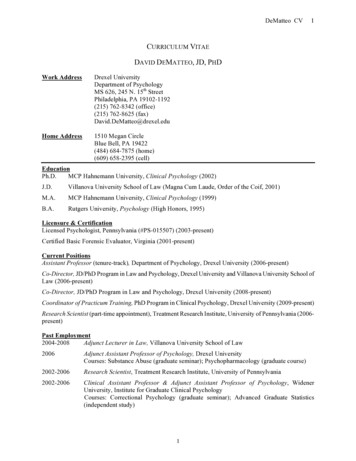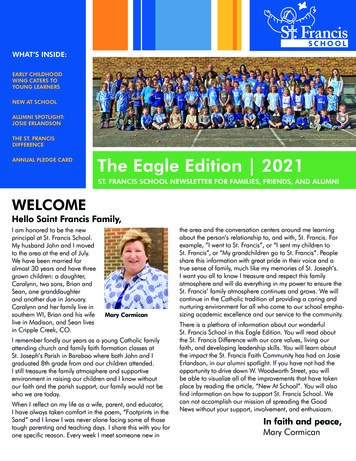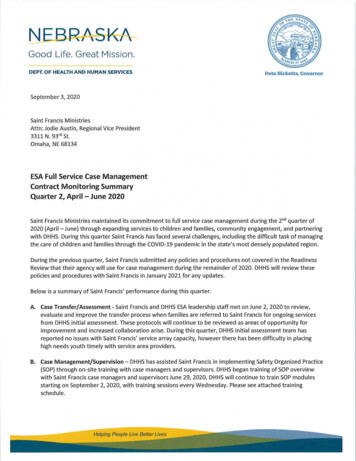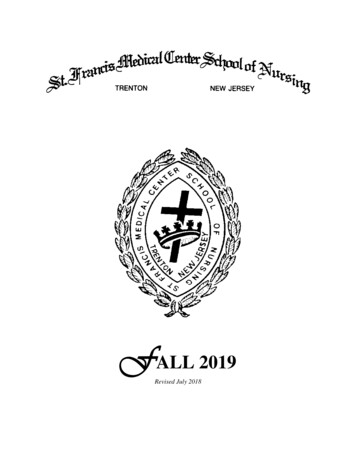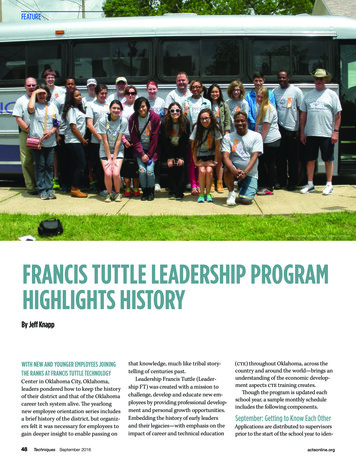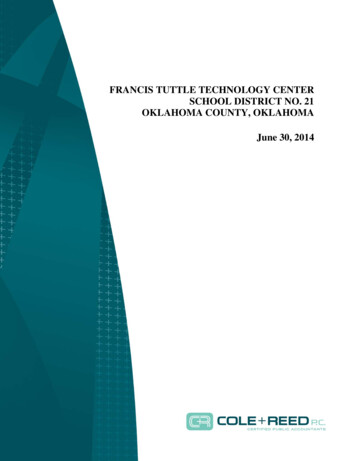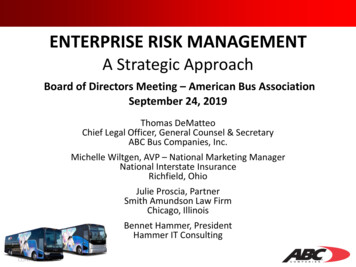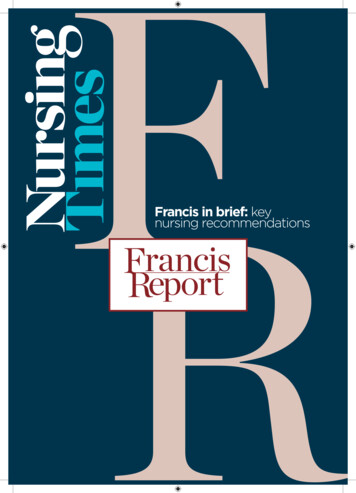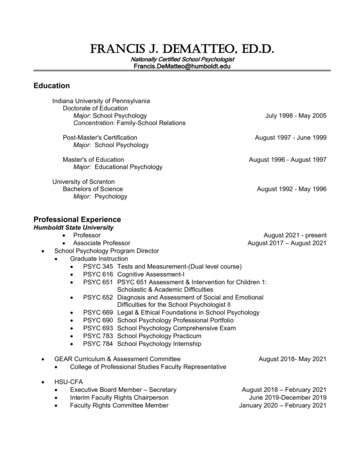
Transcription
Francis J. DeMatteo, Ed.D.Nationally Certified School Indiana University of PennsylvaniaDoctorate of EducationMajor: School PsychologyConcentration: Family-School RelationsPost-Master's CertificationMajor: School PsychologyMaster's of EducationMajor: Educational PsychologyUniversity of ScrantonBachelors of ScienceMajor: PsychologyJuly 1998 - May 2005August 1997 - June 1999August 1996 - August 1997August 1992 - May 1996Professional ExperienceHumboldt State University ProfessorAugust 2021 - present Associate ProfessorAugust 2017 – August 2021 School Psychology Program Director Graduate Instruction PSYC 345 Tests and Measurement-(Dual level course) PSYC 616 Cognitive Assessment-I PSYC 651 PSYC 651 Assessment & Intervention for Children 1:Scholastic & Academic Difficulties PSYC 652 Diagnosis and Assessment of Social and EmotionalDifficulties for the School Psychologist II PSYC 669 Legal & Ethical Foundations in School Psychology PSYC 690 School Psychology Professional Portfolio PSYC 693 School Psychology Comprehensive Exam PSYC 783 School Psychology Practicum PSYC 784 School Psychology Internship GEAR Curriculum & Assessment Committee College of Professional Studies Faculty Representative HSU-CFA Executive Board Member – Secretary Interim Faculty Rights Chairperson Faculty Rights Committee MemberAugust 2018- May 2021August 2018 – February 2021June 2019-December 2019January 2020 – February 2021
SDRC Psychoeducational Evaluation Clinic Founder & Primary SupervisorAugust 2018 – present Department of PsychologyAugust 2017 – present School Psychology Faculty Search Committee-ChairpersonNovember 2021 - present ASC Search Committee MemberJanuary 2018 – March 2018 School Psychology Graduate Committee ChairpersonAugust 2017- present Undergraduate Scholarship Review Committee MemberAugust 2018 – May 2021 Diversity, Equity, & Inclusion Committee MemberJanuary 2019 – May 2021 Department Assessment Committee MemberJanuary 2019 – May 2021 Department RTP Standards RevisionJanuary 2019 – February 2021 Committee Chairperson Professional Service Manuscript Reviewer Psychology in the Schools School Psychology International National Association of School Psychologist Annual Conference Presentation Proposal Reviewer Professional Accreditation Board-Program Reviewer Rowan & Littlefield Publishers Text Proposal ReviewerAugust 2017 – presentAugust 2018 – present(2012-2016)January 2019 – presentApril 2022 – presentMarywood UniversityAugust 2009 – May 2017 School Psychology Program-Director Tenured/Associate Professor Graduate Instruction PSY 562Cognitive Assessment PSY 563Assessment of Learning PSY 549aSchool Psychology Practicum I PSY 549bSchool Psychology Practicum II PSY 551aSchool Psychology Law and Ethics PSY 523Contemporary Learning Theories PSY 585Family School Intervention PSY 850Educational Assessment Practicum (Doctoral Level) Students On-Campus Achieving Results Program (SOAR)Co-directorAdvisory Board Member NASP Accreditation ApplicationSole author of Marywood University’s schoolpsychology program’s NASP accreditation report Higher Education for the Sisters of AfricaPrimary InvestigatorJanuary 2010 – May 2017May 2012 – February 2013December 2013 – June 2014
Nursing Department Assessment CommitteeOctober 2013 – February 2015 Graduate Curriculum CouncilRCEHD Representative Co-Chair of RCEHD NCATE StandardII Assessment CommitteeAugust 2012 – March 2014 Co-chair of Standards 7 & 14Institutional Assessment: AssessmentOf Student Learning Middle StatesWork-groupDecember 2012 – August 2015 Faculty Senateo RCEHD senator Executive Council Academic Grievance Committeeo Committee Chairperson Outcomes Assessment Committee Teacher Education Committee Periodic Review and Report Committeefor Middle States Re-accreditationAugust 2012 – May 2017August 2011 – May 2015August 2011 – August 2014November 2011-January 2012January 2011 – August 2014August 2009 – May 2017May 2010 – November 2011Director of Student Services, Tuscarora School DistrictJuly 2007 – August 2009 Primary author of the district’s plan to align with the state academic standards (SAS) Submitted to Pennsylvania Department of Education Co-reviewer of the district’s “Getting Results” plans via Pennsylvania Department of Educationto improve PSSA performance in elementary and secondary buildings Analysis and synthesis of PVAAS and E-Metric data Application of PVAAS and E-Metric Data to instructional practices
Co-author of the district’s Self Facilitated Assessment (SFA) in preparation for December 2008Special Education Audit Co-author of the district’s Chapter 12 Student Services Plan Submitted to Pennsylvania Department of Education Co-producer of district’s Truancy Prevention Program at the middle and high school levels Analysis of truancy data Coordinating building level administration, social worker, student resource officer,attendance office, and alternative education program Administrative compliance monitor for paraprofessional certification and staff developmentaccording to NCLB and Chapter 14 Regulations. Development of a district-wide service delivery model emphasizing problem-solving viaconsultation, collaboration, data-collection, and parent involvement Psychological Social Work Occupational Therapy Physical Therapy Gifted Support Audiology IST Program enhancement Implemented research based interventions via the RTI framework Program development, implementation, and supervision Home-School Visitor Program K-12 Alternative Education for Disruptive Youth Middle and High School Level K-Primer Transition to kindergarten Parent Information Project Elementary Title 1 School Psychologist Conducted psycho-educational assessments for referred children, grades K-12 Monitored district compliance with IDEA regulations and special education processes Multi-disciplinary Team (MDT) member Coordinated individualized educational plans via the (IEP) team Facilitated family and student access to community resources and agenciesAssistant Professor, Indiana University of PennsylvaniaAugust 2006 –August 2007 Department of Educational and School Psychology Graduate and undergraduate instruction-Fall Introduction to School Psychology (2-graduate) Assessment and Measurement in Teaching (2-undergraduate)
Graduate and undergraduate instruction-Spring Psychology of Adolescents (1-undergraduate) Learning and Instruction (2-graduate) Practicum-II/Clinic (1-graduate)Graduate instruction-Summer Educational Research (1-graduate) Family-School/Clinic (1-doctoral)Supervision of graduate assistants (2)Curriculum committee member Development of Learning & Instruction course (graduate) Development and implementation of clinical training model Directed case vignettes and drama studentsConsultant, Tuscarora School District (Pro-Bono)June 2006 – August 2007Adjunct Professor, Wilkes University Graduate Instruction Educational PsychologyJune 2004 – June 2006Doctoral Intern, Fulton County Medical CenterJuly 2004 – January 2005 Provided therapeutic services to children, adolescents, and families Utilized a brief, solutions-focused, problem-solving approach Fostered effective communication between families and schools Provided direct crises intervention services to children and adolescents Collaborated with physicians and community agencies to develop treatment plans Developed home-school behavior plans for youth with significant emotional needsSchool Psychologist & Second Level Evaluator, Lincoln Intermediate UnitTuscarora & Greencastle School Districts,Franklin Learning CenterAugust 2003-August 2006Shippensburg & Tuscarora School DistrictsAugust 2000 - June 2003West York School DistrictAugust 1999 - June 2000 Conducted psycho-educational assessments for referred children, grades K-12 Conducted second-level psychological evaluations for students with emotional needs Consulted with administration and staff regarding IDEA regulations and special educationprocesses Multi-disciplinary Team (MDT) member Assisted in program planning and consultant to the Individual Education Plan (IEP)program Created Functional Behavior Assessment plans (FBA) as part of MDT process Consulted with the Instructional Support Team Facilitated family and student access to community resources and agencies Support psychologist for emotional support and life skills classrooms Individual counseling with students Provided psychological services to students with emotional disturbance educated outsidethe public school setting Facilitated family-school problem-solving meetings Designed behavioral interventions for aggressive adolescents Implemented nonviolent crises intervention procedures
Consulted with the Franklin County’s District Attorney’s office for juvenile offendersInformation resource for instructors, staff, and parentsSchool Psychology Intern, Board of EducationAugust 1998 - June 1999Washington County, Maryland Provided psychoeducational services to children and youth at elementary and secondarylevels (K-12). ARD (Admission, Review or Dismissal)/ IEP (Individual Education Plan) Team member Conducted initial and triennial psychoeducational assessments Participated in program planning and placement for students meeting special educationcriteria Completed functional analyses of primary and secondary students’ behaviors Consulted with teachers and administrators Designed, implemented, and monitored behavioral management programs for students ingeneral and special education environments Facilitated the development of a behavior resource room for elementary students Established specific entrance and exit criteria and adaptive curriculum Collaborated with middle school guidance counselors Provided social skills training to eighth grade students Provided individual counseling to a seventh grade student with ADHD Consulted with emotional support teachers Provided individual counseling services to students at the high school level with identifiedemotional difficulties Student Support Team member (elementary level) Developed 504 plans and interventions to remediate poor school attendance and studentdifficulties within the educational environment Attended and conducted teacher in-service programs Member of the test review committee Reviewed and documented the technical adequacy and applicability of individuallyadministered standardized norm-referenced assessment instruments administered inWashington CountyConsultation with Blairsville, Pennsylvania Middle School Provided instructional consultation Interviewed, counseled, and observed children and teachers Participated in Instructional Support Team Planned and implemented interventionsJanuary 1998 - May 1998Child Study Center Clinician, IUPJanuary 1998 - July 1998 Provided psychological services for referred children and families Tested, consulted, interviewed, and observed children and youth in a clinical settingGraduate AssistantAugust 1996 - July 1998Administrative Associate to the Doctoral Program Assisted the Director of the Doctoral Program in School Psychology Developed norms for the Family School Achievement Rating Form Edited the annual departmental newsletter, The Consultant Filed, prepared, and sent correspondence, scheduled interviews and appointments
Research Assistant for Edward M. Levinson, Ed.D. Developed CBM Reading Norms for second grade at Blairsville-Saltsburg Elementary SchoolDistrict (Data collection and statistical analysis) Facilitated undergraduate Educational Psychology courses during professor's absenceSupervision (excluding Marywood University & Humboldt State) Tuscarora School District Social workers (2) Alternative Education Program Coordinator Philadelphia College of Osteopathic Medicine Doctoral Internship field supervisor- School PsychologyJuly 2007-July 2009January 2006 – June 2006Student ResearchProfessional ContributionsAnderson, Rebecca. (2015, May). Parent involvement during transition planning and outcomes for youngadults with autism: Self determination as a mediator. Marywood University.Balmer, Cheri. (2011, August).Alternatives to zero-tolerance policy in public education. MarywoodUniversity.Beck, Jocelyn. (2017, May). The impact of anxiety on academic achievement in the school agepopulation. Marywood University.Brandt, Sarah. (2011, May) Home-school collaboration and interviewing at risk populations: A researchassistant’s experience. Marywood University.Bedwick, Meghan. (2012, May). Self-regulated learning and students of low ses. Marywood University.Cilento, Santina. (2017, May). Transitioning transgender students: A building level support model.Marywood University.Connors, Christina. (2017, May). Agress-less: A tertiary response to social maladjustment. MarywoodUniversity.Conway, Courtney. (2015, May).Social skills training for adolescents with autism spectrum disorder.Marywood University.Donath, Laura. (2013, May). A school based cyber-bullying prevention program. Marywood University.Dougherty, Sharon. Motivation to learn: Environmental and instructional factors. (Discontinued).Dvorshock, Nichole. (2010, August). Social skills training with students with autism spectrum disorder:Research and personal experience. Marywood University.Fasciana, Michael. (2011, August).Social skills training and students with autism: A focus on nonverbalbehavior. Marywood University.Finn, Mary. (2011, March). A family-based model to decrease bullying behavior. Marywood University.
Francis, Justine. (2011, May). Young adults with autism spectrum disorder: Transition to adult life andthe family. Marywood University.Froio, Samantha. (2017, May). The school as a community: Supporting students coping with cancer.Marywood University.Gazoo, Corey. (2016, May). A bullying prevention at the high school level. Marywood University.Giacometti, Melissa. (2010, May). Effects of parent involvement on students’ academic motivation,attitude toward school, and parent-child relationship. Marywood University.Gilpin, Simone. (2014, May) Student and teacher perceptions of education: Academic success andbarriers. Marywood University.Grant, Jule. (2011, May). Mindreading and young adults with autism spectrum disorder: A researchassistant’s experience . Marywood University.Hahn, Felicity. (2012, May). Externalizing disorders: Environment, treatment options, and suggestionsfor effective programming. Marywood University.Hricko, Kristin. (2010, June). Overcoming teacher resistance to school-wide positive behavior supportprograms. Marywood University.Jones, Amanda. (2011, August). Aligning classroom instruction with cognitive load theory: A focus onstudents with disabilities. Marywood University.Jones, Molly. (2017, May). School age students with chronic illnesses: Offering support in a schoolsetting. Marywood University.Kester, Rachel. (2017, May). Home school relationships with early intervention families. MarywoodUniversity.Kirkpatrick, Kelly. (2010, August). Excessive video game usage and attentional problems in adolescents.Marywood University.Kozemko, Jessica. (2010, May). Job coaching a high school student with autism spectrum disorder.Marywood University.Kresge, Allison. (2010, June). Role of paraprofessionals in mediating student friendships. MarywoodUniversity.Littleford, Samantha. (2016, May). Educational technology: A tool to support teaching and learning in the21st century. Marywood University.Maldonado, Celeste. (2012, December). Resource versus service model to support transition needs offamilies with autism spectrum disorder.McGuire, Caitlin. Social skills training and students with autism spectrum disorder: Communication.(Discontinued).
Milz, William. (2012, May). Adapting parent child interaction therapy to the classroom environment.Marywood University.Murray, Katelyn, (2016, May). Early mindful interventions: Using self-regulation strategies of attentionand emotion to improve academic success in elementary school students with attentiondifficulties and behavioral needs. Marywood University.Muto, Erica. (2011, August). Students with emotional and behavioral difficulties in a partial hospitalizationprogram: A family approach. Marywood University.Pautz, Emily. (2015, May).Bullying prevention through collaboration. Marywood University.Paulhamus, Marci. (2012, May). Social skills training and students with autism: Inclusion considerations.Marywood University.Reese, Amanda. (2012, May). Social skills training and students with autism: A dining etiquette program.Marywood University.Ritts, James. (2012, May). A school based family program to address parent-child interactions.Roberts, Nichole. (2010, May). De-mystifying mindfulness for educators. Marywood University.Royer, Andrew. (2016, May). School based trauma therapy for students emotionally at risk students.Marywood University.Rozelle, Cassandra. (2012, May).Predictors of parent involvement in an after-school program for at-riskyouth. Marywood University.Rupp, Katrina. (2014, May). Specific school based intervention strategies for students diagnosed withpost-traumatic stress disorder: The use of canine support within schools. Marywood University.Uppling, Kelsey. (2014, May). Young adults with autism spectrum disorder: Video portfolios andTransition Marywood University.Vennero, Jessica. (2012, May). Cyberbullying prevention. Marywood University.Williams, Trina. (2014, May). Teacher characteristics that influence student motivation. MarywoodUniversity.Thesis-Committee MemberBagonis, Jessye (September 2012).Children’s perceptions of the sibling subsystem: Comparing thekinetic family drawing to the sibling relationship questionnaire. Marywood University. [Art TherapyDepartment]Esenbock, Baby Vivian (in process). Comparisons of spatial reasoning abilities of string and non-stringprofessional musicians. Humboldt State University. (Department of Psychology]. Master’s Thesis.Feeney, Leanne (March 2014). Components of effective secondary transition programs for special needsstudents. Marywood University. [Education Department] Undergraduate Honors Thesis.
Gonzales-Herrera, I (December 2019). Bully victimization, depression, and school connectedness inearly adolescent students. Humboldt State University. [Department of Psychology] Master’sThesis.Harney, Sarah (2005). Use of child occupational self-assessment to write child centered IEP goals.(Belmont University).Neri-Luchanski, Amanda. (November 2011) Positive illusionary bias and students with ADHD. MarywoodUniversity. [Psychology Department]O’Brien, Sarah. (May 2011).Predictors of socially accepting students with autism spectrum disorder.Marywood University. [Education Department]Surace, Amanda (September 2013). Defining mindfulness: A comparison of two prominent definitions ofmindfulness in current literature using the linguistic and word count software (LIWC). MarywoodUniversity. [Psychology Department]Szilagyi, Vanessa (May 2014). Working memory and the relationship to memory for unpredictable wordsof a text. Marywood University. [Psychology Department]White, Whitney. (September 2011). Lexical selection by competition in the picture-word interferenceparadigm. Marywood University. [Psychology Department]Dissertation-ReaderBoyle, Ricky (March 29, 2012). Adult to student bullying in secondary school settings. MarywoodUniversity.Ivey, Benjamin (March 21, 2014). Priming for improved attention to auditory social stimuli in children withautism spectrum disorders. Marywood University.Montoro- Edwards, Maria (March 30, 2010). Predictors of funded scholarly activity at 4-year non-doctoralcolleges and universities. Marywood University.Provinzano, Kathleen. (June 25, 2010). Northeastern Pennsylvania principals knowledge of theconstitutional rights of students as determined by select united states supreme court decisions.Marywood University.Dissertation Committee MemberBrandt, Sarah (April 2021). The Intersection of Law, Policy, and Practice: School Psychologists’Perspective on Special Education in the Virtual School Setting. Wilkes-University.Daniels-Acevedo, Christine. The effectiveness of school bullying programs on the reporting ofcyberbullying. Marywood University (Discontinued May 2017).Sanders, Nadine. (2009). Effects of implementing school-wide positive behavior support on officereferrals and academic performance. Duquesne University.Shemanski, Katie. (2016). Behavior speak: Does use of behavior jargon affect teacher acceptability ofpositive behavior interventions? Philadelphia College of Osteopathic Medicine.
Shey, Jason. (2015). The effects of e-books on reading fluency, comprehension, and prosidy. MarywoodUniversity.Dissertation-ChairGruber, Mary. (December 15, 2010). Combining individual and group therapy for students withaggression: A case analysis and review. Marywood University.LaRosa, Cynthia. (August 2016- May 2017). Examining issues surrounding the mental health ofsecondary students: Perceptions of public school administrators. Marywood University.Murphy Fox, Mary (March 23, 2012). Theory of mind and young adults with autism spectrum disorder:The influence of mindreading and instructional peer coaches. Marywood University.McGill, Elizabeth. (March 17, 2015). Predictors of bullying on a university campus. Marywood University.PhD Qualifying Paper-Reader & DefenseCarroll, Kelly (April 2015). Motivating at-risk disruptive youth in public schools through interventionpractices. Marywood University.Lemoncelli, Mark (May 7, 2014). Crises plans in schools: Are we ready to deal with crisis? MarywoodUniversity.Lichtenwalner, John (December 11, 2012). What is the impact of asynchronous computer mediatedcommunication on the delivery of professional services? Marywood University.McGill, Elizabeth (April 18, 2013). What are the effects of bullying on secondary students examinedthrough education, psychology, and health? Marywood University.Maheen Mirza, Annina. (April 29, 2010). Why is wellness important for college students. MarywoodUniversity.Shipman, Sue (May 2015). Beyond not receiving a diploma: What are further implications associatedwith the decision to drop-out of high school.Shumacher, Lisa. (November 25, 2013). Considerations for a comprehensive teacher evaluation.Marywood University.PublicationsBooksDeMatteo, F. J. (2020). Delivering psychoeducational evaluation results to parents: A practitioner’sguide. Routledge Publishers. https://doi.org/10.4324/9780429Peer ReviewedArter, P.S., DeMatteo, F.J., Gonzalez, M., & Brown, T. (2016). Technology enhanced mentorship to
improve instruction and reflection for teacher candidates. Proceedings of Society for InformationTechnology & Teacher Education International Conference 2016 (pp. 1622-1625). Chesapeake,VA: Association for the Advancement of Computing in Education.Arter, P. S., DeMatteo, F. J., & Brown, T. (Fall 2015). Additional preparation in meeting diverse needs:Does it make a difference? National Teacher Education Journal, 8, 3, 29-36.Arter, P., DeMatteo, F. J., Paulhamus, M., & Reese, A. (2012). Bridging the gap: An interdisciplinaryexperiential model between school psychology and special education. Pennsylvania TeacherEducator, 11, 51-56.DeMatteo, F.J. (2006). Crisis prevention and intervention in the classroom: What teachers should know.[Review of the book Crisis prevention and intervention in the classroom: What teachers shouldknow]. Communique, 35(2). National Association of School Psychologists.DeMatteo, F. J. (2011). A review of V.B. Damiani’s Crisis prevention and intervention in the classroom:What teachers should know-second edition. Rowan & Littlefield Education.DeMatteo, F. J. (2014). Mentoring student research: An overview of statistical power. The Journal of thePennsylvania Counseling Association, 13, 1, 77-80.DeMatteo, F. J. & Arter, P. S. (2015). When job skills are not enough: Transitioning young adults withautism spectrum disorder. Electronic Journal for Inclusive Education, 3, (3).DeMatteo, F. J., Arter, P, Sworen-Parise, C, Fasciana, M. & Paulhamus, M. (2012). Social skills trainingfor young adults with autism spectrum disorder: Overview and implications for practice. NationalTeacher Education Journal, 5, 4, 57-66.DeMatteo, F. J. & Brown, T. H. (2014). Teacher perceptions of new literacies. National TeacherEducation Journal, 7, 3, 31-44.DeMatteo, F. J., Levinson, E. M., & Hoellein, R. H. (2000). A review of the attention deficit disordersevaluation scales. Journal of Psychoeducational Assessment, 18, 177-184.Levinson, E. M., McKee, L. & DeMatteo, F. J. (1999). The Exceptional Child Grows Up: TransitionFrom School to Adult Life. In M. Fine's (Ed.), Collaboration with parents of exceptional children.(2nd ed). Austin, TX: PRO-ED.Roberts, N. & DeMatteo, F. J. (2012). Demystifying mindfulness for educators. Teacher Education andPractice, 25(2), 173-183.Shemanski, K, DeMatteo, F. J., & Fruehan, A. (2018). Behavior jargon and teacher acceptability ofpositive behavior interventions. School Psychology 4747Snyder, E. P., Quirk, K., & DeMatteo, F.J. (2010). Consulting with families, schools, and communities. InT.M. Lionetti, E.P. Snyder, & R. W. Christner (Eds), A practical guide to building professionalcompetencies in school psychology. (pp 69-82). Springer Publishing.Non-peer reviewed
Anderson, R. H., Littleford, S. & DeMatteo, F. J. (February 2015). Mindful parenting: Promoting positiveand present parent-child relationships. Family Focus. Hildebrandt Learning Center, LLC.Anderson, R. H., Littleford, S. & DeMatteo, F. J. (February 2015). Temper Tantrums: Tips to Tackle“Terrible” Toddlerhood. Family Focus. Hildebrandt Learning Center, LLC.DeMatteo, F. J. (August 2013). Building reading skills in young children: Phonological awareness.Family Focus. Hildebrandt Learning Center, LLC.DeMatteo, F. J., Christner, R. W. & Erdlen, R. (Spring 2003). Explaining evaluation results to parents.InSight. Association of School Psychologists of Pennsylvania.DeMatteo, F. J. & Johnston, J. (May 2009). Sparking student achievement: Programs that producesuccess. Pennsylvania Elementary and Secondary School Administrator.DeMatteo, F. J., Ohler, D., & Levinson, E. M. (Spring 1998). Job dissatisfaction, stress, & burnoutamong school psychologists. InSight. Association of School Psychologists of Pennsylvania.Littleford, S. & DeMatteo, F. J. (December 2015). iPreschool: Apps, mobile learning, and preschoolers.Family Focus. Hildebrandt Learning Center, LLC.Littleford, S. & DeMatteo, F. J. (August 2014). Meet the new teacher, Mr. television. Family Focus.Hildebrandt Learning Center, LLC.Littleford, S., Major, S., Murray, K. (August 2015) Parental involvement: Positives and pointers. FamilyFocus. Hildebrandt Learning Center, LLC.Littleford, S. & DeMatteo, F. J. (October 2014). Physical activity for preschoolers: Tips for parents,caregivers, and educators. Family Focus. Hildebrandt Learning Center, LLC.Szilagyi, V. & DeMatteo, F. J. (October 2013). Developing early literacy skills through parent-childreading. Family Focus. Hildebrandt Learning Center, LLC.Szilagyi, V. & DeMatteo, F. J. (May 2014). School readiness: Separating fact from fiction. Family Focus.Hildebrandt Learning Center, LLC.Uppling, K. & DeMatteo, F. J. (December 2013). Positive attitudes toward school and preschoolers: Tipsfor parents. Family Focus. Hildebrandt Learning Center, LLC.Williams, T., Uppling, K., Szilagyi, V., & DeMatteo, F. J. (February 2014). Bullying defined: An overviewof characteristics and steps to prevention. Family Focus. Hildebrandt Learning Center, LLC.PresentationsRecent National PresentationsArter, P. & DeMatteo, F. J. (June 2012). Creating a community of practice between community agencies,secondary, and post secondary institutions. Lilly Conference on College and UniversityTeaching. Washington, D.C.
Arter, P.S. & DeMatteo, F. J. (April 2016). Where are they now? Successes and challenges of studentswith autism spectrum disorder. Council for Exceptional Children 2016 Annual Conference St.Louis, Missouri.Arter, P.S. & DeMatteo, F.J. (October 2016). Where are the now? Successes and challenges ofstudents with autism spectrum disorder post graduation. Council for Exceptional Children’sDivision of Career Development and Transition, Myrtle Beach, SC.Arter, P.S. & DeMatteo, F. J. (April 2017). Who works? We do! Students’ voices on successful transitionfrom school to work. Council for Exceptional Children 2016 Annual Conference 2017 AnnualConference Boston, Massachusetts.Arter, P. & DeMatteo, F. J., Uppling, K., & Williams, T. (November 2013). Bridging the gap: Aninterdisciplinary, experiential model between school psychology and special education. TeacherEducation Division of the Council for Exceptional Children Annual 2013 National Conference. Ft.Lauderdale, Florida.Arter, P. & DeMatteo, F.J., Uppling, K., & Williams, T. (February 2014). Transition: It takes a village.Council for Exceptional Children 2014 Annual Conference. Philadelphia, PA. (Poster-Session)Arter, P. & DeMatteo, F.J., Williams, T., & Uppling, K. (November 2013). Transition: It takes a village.Teacher Education Division of the Council for Exceptional Children 2013 National Conference. Ft.Lauderdale, Florida.Arter, P.S., DeMatteo, F.J., Gonzalez, M., & Brown, T. (March 2016). Technology enhanced mentorshipto improve instruction and reflection for teacher candidates. Roundtable presentation at Societyfor Information Technology and Teacher Education Conference, Savannah, GA.Brown, T. & DeMatteo, F. J. (December 2012). Building capacity to utilize digital texts and tools in ablended learning environment. Literacy Research Association 2012 Annual Conference: SanDiego, California.Brown, T. & DeMatteo, F. J. (October 2015). Developmental relationships: The key to success in anacademic mentoring program. University of New Mexico Mentoring Institute’s 8th Annu
School Psychologist & Second Level Evaluator, Lincoln Intermediate Unit . Tuscarora & Greencastle School Districts, Franklin Learning Center August 2003-August 2006 . Shippensburg & Tuscarora School Districts August 2000 - June 2003 . West York School District August 1999 - June 2000
